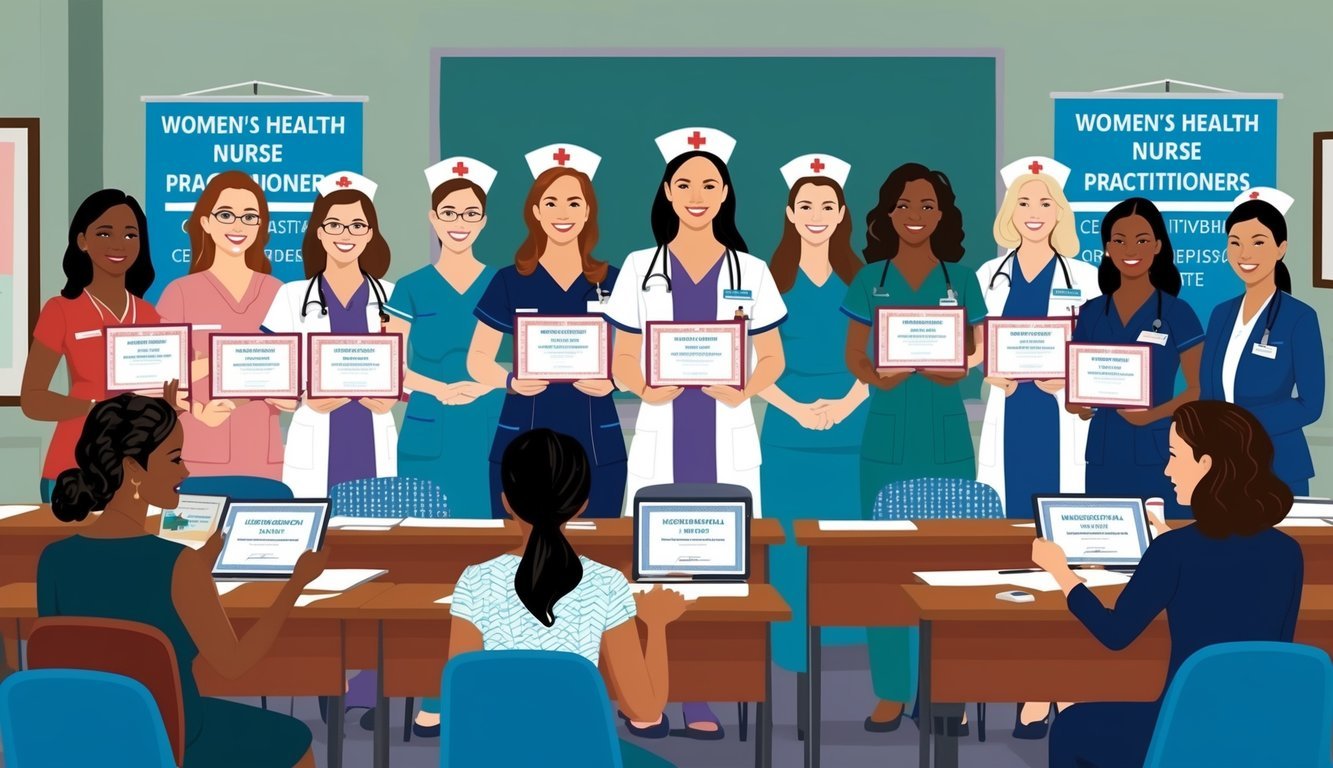Women’s health nurse practitioner programs prepare you to provide specialized care for women throughout their lives.
These programs typically last 1-2 years and can lead to rewarding careers with strong salary potential and growth opportunities.
With the rising need for healthcare professionals focused on women’s health, now is an excellent time to explore this field.
As you consider pursuing a career in nursing with a focus on women’s health, you’ll need to understand key aspects such as program requirements, tuition costs, and certification processes.
Gaining insight into what these programs entail will help you make informed decisions about your education and career path.
Becoming a women’s health nurse practitioner can open many doors, from working in clinical settings to engaging in community health initiatives.
The journey may seem challenging, but the impact you can have on women’s health is invaluable.
Key Takeaways
- Women’s health NP programs offer specialized education in women’s health care.
- Certification and licensure are crucial steps after completing your program.
- Career opportunities in this field are diverse and growing.
Overview of Women’s Health Nurse Practitioner Programs
Women’s health nurse practitioner programs prepare you to provide specialized care for women throughout their lives.
These programs focus on clinical placement, nursing education, and accreditation, ensuring you are well-equipped to succeed in this rewarding field.
Clinical Placement and Experience
Clinical placement is a crucial part of your education in women’s health nurse practitioner programs.
These placements allow you to gain hands-on experience in various settings, such as clinics, hospitals, and community health organizations.
You can expect to work directly with patients under the supervision of experienced clinicians.
This practical training ensures you apply theoretical knowledge to real-world situations.
Many programs have partnerships with local healthcare facilities, facilitating a wider range of clinical experiences.
Online WHNP programs also offer opportunities for clinical placements, often allowing you to arrange them in your local area to accommodate your schedule.
Nursing Education and Accreditation
To practice as a women’s health nurse practitioner, you must complete an accredited nursing education program.
Most programs award a Master of Science in Nursing (MSN) or a Doctor of Nursing Practice (DNP).
Accreditation is vital as it validates the program’s quality.
Look for programs accredited by the Accreditation Commission for Education in Nursing or the Commission on Collegiate Nursing Education.
Accredited programs meet specific standards that prepare you for certification exams and ensure quality education.
Completing an accredited program also increases your job prospects and earning potential, as employers often prefer graduates from reputable institutions.
Program Length and Flexibility
The length of women’s health nurse practitioner programs can vary.
Typically, MSN programs take about two years to complete if attending full-time.
DNP programs usually require three to four years, depending on prerequisites and part-time or full-time enrollment.
Flexibility is another key aspect of these programs.
Many institutions offer online nurse practitioner programs, giving you the option to study at your own pace.
This is especially beneficial for working professionals.
Be sure to compare different program structures to find one that aligns with your personal and professional responsibilities.
Consider factors like part-time availability and accelerated options to meet your needs effectively.
Certification and Licensure

To practice as a Women’s Health Nurse Practitioner (WHNP), you must meet specific certification and licensure requirements.
Understanding this path is crucial for advancing your career in women’s health.
Certification Requirements and Processes
To become a WHNP, you need to complete a graduate program in nursing that is accredited.
After graduation, you must obtain your national certification.
The basic steps include:
- Earn a Degree: Complete a Master of Science in Nursing (MSN) or Doctor of Nursing Practice (DNP) focusing on women’s health.
- Apply for Certification: Submit your application to a certifying body, usually the National Certification Corporation (NCC).
- Pass the Exam: You are required to pass the WHNP certification exam. This evaluates your knowledge and skills in women’s health.
- Continuing Education: Renew your certification every five years through continuing education and clinical practice.
Completing these steps ensures you have the credentials needed to practice effectively.
Board Certification Through National Certification Corporation
Board certification is a significant milestone in your nursing career.
The National Certification Corporation (NCC) offers WHNP certification, which is highly regarded.
- Eligibility: To qualify for the NCC exam, you must hold a valid RN license and complete an accredited graduate program.
- Exam Details: The exam consists of multiple-choice questions covering various topics like prenatal care, reproductive health, and patient management.
- Certification Benefits: Achieving board certification demonstrates your commitment to excellence. It enhances your qualifications and can lead to better job opportunities and increased earning potential.
You can find more information about the certification process on the National Certification Corporation website.
Curriculum and Core Competencies
This section explores the essential elements of women’s health NP programs, focusing on advanced practice nursing courses and specialty training in women’s health.
Understanding these components is crucial for achieving the competencies needed for effective practice in this field.
Advanced Practice Nursing Courses
In women’s health NP programs, advanced practice nursing courses provide a strong foundation.
Courses typically include health assessment, advanced pharmacology, advanced pathophysiology, and epidemiology.
These topics equip you with the necessary knowledge to assess and manage patient care effectively.
Clinical courses offer valuable hands-on experience, allowing you to apply theoretical knowledge in practice settings.
You can expect to complete clinical hours that include both supervised and independent practice.
The DNP curriculum emphasizes evidence-based practice, ensuring you are prepared to make informed decisions about patient care.
Through these courses, you will also learn about quality improvement, which is key to enhancing patient outcomes.
Specialty in Women’s Health and Primary Care
Specialty training in women’s health integrates comprehensive knowledge and skills to support diverse patient needs.
This focus includes disease prevention and health promotion tailored specifically for women across various life stages.
Clinical training often includes specialized clinical practice hours directed towards women’s health issues like prenatal care, reproductive health, and menopause management.
You will engage in clinical experiences that prepare you for real-world challenges.
The curriculum emphasizes the importance of health promotion strategies and how to implement them effectively.
This ensures that you can guide patients toward better health practices.
Focusing on women’s unique health concerns allows you to become a skilled practitioner capable of addressing a wide range of issues.
For more detailed guidelines, refer to the Women’s Health Nurse Practitioner Guidelines.
Core Clinical Competencies

In women’s health nurse practitioner (WHNP) programs, core clinical competencies are essential for providing comprehensive care.
These competencies address key aspects of women’s health, such as reproductive healthcare, family planning, and health equity.
Understanding these areas will enhance your ability to deliver effective, patient-centered care.
Primary Care and Reproductive Healthcare
Primary care is vital for maintaining overall health.
As a WHNP, you will focus on general wellness, well-woman care, and reproductive health needs.
Your role includes assessments, screenings, and education on issues like sexual health and cancer prevention.
You will provide preconception and postpartum care to support women through various life stages.
Empowering patients with knowledge about their bodies enhances decision-making regarding health.
Familiarity with guidelines for preventive care will help ensure you meet the standards of practice.
Family Planning, Fertility, and Menopause
Family planning is a key competency in women’s health.
As a WHNP, you will offer counseling and services related to birth control options and fertility awareness.
Understanding different family planning methods allows you to provide tailored recommendations based on individual needs.
Additionally, menopause management is critical.
You will help women navigate symptoms and treatment options.
Providing education about hormonal changes can ease the transition and improve quality of life.
Health Equity and Patient-Centered Care
Health equity is crucial in delivering quality care.
You will learn to address disparities by incorporating health equity into your practice.
This focus ensures that all patients receive fair and just access to care regardless of background.
Patient-centered care emphasizes treating patients as partners in their health journey.
You will practice holistic care, considering not only physical but also emotional and social aspects of wellness.
Utilizing a health equity curriculum will enhance your ability to recognize and advocate for diverse patient needs.
Career Outcomes and Opportunities

After completing a women’s health nurse practitioner (WHNP) program, you can look forward to a variety of exciting career paths.
Your training will prepare you for roles in clinical practice, health education, and collaboration in interprofessional teams.
Clinical Sites and Post-Graduation Practice
As a WHNP, you have access to diverse clinical sites for your practice.
These may include:
- Hospitals
- Community health clinics
- Private practices
- Women’s health centers
Your hands-on training in these settings equips you to provide comprehensive care.
Many graduates find employment in private practices, where they can focus on individualized patient care.
Opportunities also exist in larger healthcare systems that offer specialized women’s health services.
Utilizing resources such as Nursing Process can help you locate potential clinical placements.
Advanced Practice Roles and Interprofessional Opportunities
With your WHNP certification, you qualify for advanced practice roles.
These posts often include:
- Nurse Practitioner (NP)
- Nurse-Midwife (CNM)
In these roles, you will collaborate with other healthcare providers to create comprehensive care plans.
Your ability to educate patients on health issues can enhance community well-being.
You might also engage with other professionals, such as social workers and dietitians, to address broader health concerns.
This teamwork is essential for advancing women’s health initiatives and improving health outcomes.
Tuition, Admission, and Program Details

When considering a Women’s Health Nurse Practitioner (WHNP) program, it’s important to understand the costs, admission requirements, and available learning formats.
Here is an overview of each aspect to help you make an informed decision.
Program Costs and Financial Considerations
Tuition costs for WHNP programs can vary widely based on the institution and program type.
Below is a general table to give you an idea of what to expect:
| Program Type | Average Tuition Cost |
|---|---|
| Online Master’s (MSN) | $20,000 – $60,000 |
| On-Campus Master’s | $25,000 – $70,000 |
| Doctorate (DNP) | $30,000 – $80,000 |
Keep in mind that additional costs may include textbooks, supplies, and fees for certification exams.
Financial aid, scholarships, and payment plans may be available to help manage expenses.
Admission Criteria for Prospective Students
To gain admission into a WHNP program, you generally need to meet specific criteria:
- Bachelor’s Degree: You must have a BSN or a related degree.
- GPA Requirements: Many programs require a minimum GPA, typically around 3.0.
- Licensure: You often need a valid RN license.
- Experience: Some programs prefer candidates with clinical experience in women’s health or related fields.
- Letters of Recommendation: Most programs ask for 2-3 professional references.
Always check each program’s specific requirements, as they can differ.
Distance Learning and Modified Programs
Distance learning options for WHNP programs provide greater flexibility.
Many schools now offer online formats to accommodate working professionals.
- Online Programs: Fully online MSN and DNP programs are available, allowing you to study at your own pace.
- Hybrid Formats: Some programs combine online coursework with on-campus clinical placements, providing a balanced experience.
Typically, online WHNP programs may take 2-4 years to complete.
They often feature asynchronous classes, allowing you to manage your own schedule.
For further details on the best online programs, you can check out NursingProcess.org.
Frequently Asked Questions
When considering a Women’s Health Nurse Practitioner program, you may have several questions.
Below are some common inquiries regarding admission requirements, program duration, costs, online versus on-campus options, certification processes, job prospects, and clinical practice integration.
What are the admission requirements for Women’s Health Nurse Practitioner programs?
Admission requirements can vary by program but often include a Bachelor of Science in Nursing (BSN), a valid nursing license, and relevant clinical experience.
Some programs may ask for letters of recommendation, a personal statement, and a minimum GPA.
What is the average duration and cost of Women’s Health NP programs?
Typically, these programs take 2-3 years to complete when attended full-time.
Tuition costs can vary widely; for example, full-time tuition may be around $93,144 at certain universities.
Part-time options may increase total costs due to extended enrollment.
How do online Women’s Health NP programs compare to on-campus options?
Online programs can offer greater flexibility, allowing you to study at your own pace while balancing other responsibilities.
On-campus programs may provide more hands-on experience through direct interactions with faculty and peers, which can enhance learning.
What are the certification and licensing processes for graduates of Women’s Health NP programs?
After completing your program, you must pass a national certification exam to practice as a Women’s Health Nurse Practitioner.
Licensing requirements may vary by state, so make sure to check the regulations specific to your location.
What are the job prospects and average salary for a Women’s Health Nurse Practitioner?
Women’s Health Nurse Practitioners have good job prospects, often with flexibility in work hours.
As of recent data, the average salary for this role is around $105,000, which can vary by geographic region and level of experience.
How do Women’s Health NP programs integrate clinical practice into their curriculum?
These programs typically include a mix of classroom education and clinical placements.
This allows students to gain hands-on experience in various healthcare settings.

